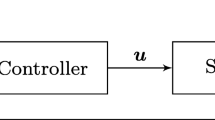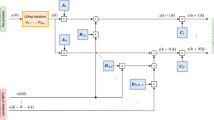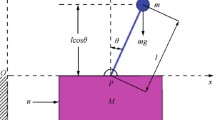Abstract
For linear parameter varying (LPV) systems with unknown scheduling parameters and bounded disturbance, a synthesis approach of dynamic output feedback robust model predictive control (OFRMPC) with input saturation is investigated. By pre-specifying partial controller parameters, a main optimization problem is solved by convex optimization to reduce the on-line computational burden. The main optimization problem guarantees that the estimated state and estimation error converge within the corresponding invariant sets such that recursive feasibility and robust stability are guaranteed. The consideration of input saturation in the main optimization problem improves the control performance. Two numerical examples are given to illustrate the effectiveness of the approach.
Similar content being viewed by others
References
D. Q. Mayne, J. B. Rawlings, C. V. Rao, and P. O. M. Scokaert, “Constrained model predictive control: stability and optimality,” Automatica, vol. 36, no. 6, pp.789–814, June 2000. [click]
S. J. Qin and T. A. Badgwell, “A survey of industrial model predictive control technology,” Control Engineering Practice, vol. 7, no. 11, pp.733–764, July 2003. [click]
M. L. Darby and M. Nikolaou, “MPC: Current practice and challenges,” Control Engineering Practice, vol. 20, no. 4, pp.328–342, April 2012.
P. Bumroongsri, “Tube-based robust MPC for linear timevarying systems with bounded disturbances,” International Journal of Control, Automation and Systems, vol. 13, no. 3, pp.620–625, June 2015. [click]
D. Q. Mayne, “Model predictive control: recent developments and future promise,” Automatica, vol. 50, no. 12, pp.2967–2986, December 2014. [click]
Z. Y. Wan and M. V. Kothare, “Robust output feedback model predictive control using off-line linear matrix inequalities,” Journal of Process Control, vol. 12, no. 7, pp.763–774, October 2002. [click]
B. C. Ding and X. B. Ping, “Output feedback predictive control with one free control move for nonlinear systems represented by a Takagi-Sugeno Model,” IEEE Transactions on Fuzzy Systems, vol. 22, no. 2, pp.249–263, April 2014.
D. W. Li, Y. G. Xi, and F. R. Gao, “Synthesis of dynamic output feedback RMPC with saturated inputs,” Automatica, vol. 49, no. 4, pp.949–954, April 2013. [click]
B. C. Ding, Y. G. Xi, M. T. Cychowski, and T. O'Mahony, “A synthesis approach for output feedback robust constrained model predictive control,” Automatica, vol. 44, no. 1, pp.258–264, January 2008. [click]
B. C. Ding, “Dynamic output feedback predictive control for nonlinear systems represented by a Takagi-Sugeno model,” IEEE Transactions on Fuzzy Systems, vol. 19, no. 5, pp.831–843, October 2011.
B. C. Ding, X. B. Ping, and H. G. Pan, “On dynamic output feedback robust MPC for constrained quasi-LPV systems,” International Journal of Control, vol. 86, no. 12, pp.2215–2227, December 2013. [click]
B. C. Ding, “Dynamic output feedback MPC for LPV systems via near-optimal solutions,” Proceedings of the 30th Chinese Control Conference, pp. 3340–3345, Yantai, China, July 2011.
X. B. Ping and B. C. Ding, “Dynamic output feedback robust model predictive control based on ellipsoidal estimation error bound,” Acta Automatica Sinica (in Chinese), vol. 40, no. 2, pp.219–226, February 2014.
S. Kanev, C. Scherer, M. Verhaegen, and B. De Schutter, “Robust output-feedback controller design via local BMI optimization,” Automatica, vol. 40, no. 7, pp.1115–1127, July 2004. [click]
J. G. VanAntwerp and R. D. Braatz, “A tutorial on linear and bilinear matrix inequalities,” Journal of Process Control, vol. 10, no. 4, pp.363–385, August 2000. [click]
O. Toker and H. Özbay, “On the NP-hardness of solving bilinear matrix inequalities and simultaneous stabilization with static output feedback,” Proceedings of the American Control Conference, pp. 2525–2526, Seattle, USA, June 1995.
L. El Ghaoui, F. Oustry, and M. AitRami, “A cone complementarity linearization algorithm for static outputfeedback and related problems,” IEEE Transactions on Automatic Control, vol. 42, no. 8, pp.1171–1176, August 1997.
Y. Y. Cao and Z. L. Lin, “Min-max MPC algorithm for LPV systems subject to input saturation,” IEE Proceedings-Control Theory and Applications, vol. 152, no. 3, pp.266–272, May 2005.
T. S. Hu, Z. L. Lin, and B. M. Chen, “Analysis and design for discrete-time linear systems subject to actuator saturation,” Systems & Control Letters, vol. 45, no. 2, pp.97–112, February 2002.
S. W. Yun, Y. J. Choi and P. G. Park, “State-feedback disturbance attenuation for polytopic LPV systems with input saturation,” International Journal of Robust and Nonlinear Control, vol. 20, no. 8, pp.899–922, May 2010. [click]
Q. Zheng and F. Wu, “Output feedback control of saturated discrete-time linear systems using parameter-dependent Lyapunov functions,” Systems & Control Letters, vol. 57, no. 11, pp.896–903, November 2008. [click]
F. Wu, Z. L. Lin and Q. Zheng, “Output feedback stabilization of linear systems with actuator saturation,” IEEE Transactions on Automatic Control, vol. 52, no. 1, pp.122–128, January 2007.
H. Huang, D. W. Li, Z. L. Lin, and Y. G. Xi, “An improved robust model predictive control design in the presence of actuator saturation,” Automatica, vol. 47, no. 4, pp.861–864, April 2011. [click]
A. Alessandri, M. Baglietto, and G. Battistelli, “On estimation error bounds for receding-horizon filters using quadratic boundedness,” IEEE Transactions on Automation Control, vol. 49, no. 8, pp.1350–1355, August 2004.
A. Alessandri, M. Baglietto, and G. Battistelli, “Design of state estimators for uncertain linear systems using quadratic boundedness,” Automatica, vol. 42, no. 3, pp.497–502, March 2006. [click]
A. Sala and C. Arino, “Asymptotically necessary and sufficient conditions for stability and performance in fuzzy control: application of Polya’s theorem,” Fuzzy Sets and Systems, vol. 158, no. 24, pp.2671–2686, December 2007. [click]
P. Gahinet, A. Nemirovski, A. J. Laub, and M. Chilali, LMI Control Toolbox for Use with MATLAB, User’s guide, The Math Works Inc., Natick, MA, 1995.
Author information
Authors and Affiliations
Corresponding author
Additional information
Recommended by Associate Editor Sukho Park under the direction of Editor PooGyeon Park. This work was funded by the National Nature Science Foundation of China (NSFC, 61403297). The authors extend their appreciation to the International Scientific Partnership Program ISPP at King Saud University for funding this research Work through ISPP#0079
Xubin Ping received the Bachelor’s degree from Northwest University, Xi’an, China, in 2005 and the Master’s degree from the East China University of Science and Technology, Shanghai, China, in 2008 and the Ph.D. degree from Xi’an Jiaotong University, Xi’an, China, in 2013. His research interests include robust control, model predictive control.
Zhiwu Li received the B.S., M.S., and Ph.D. degrees in mechanical engineering, automatic control, and manufacturing engineering, respectively, all from Xidian University, Xi’an, China, in 1989, 1992, and 1995, respectively. He joined Xidian University in 1992 and now he is also with the Institute of Systems Engineering, Macau University of Science and Technology, Taipa, Macau. Over the past decade, he was a Visiting Professor at the University of Toronto, Technion-Israel Institute of Technology, Martin-Luther University of Halle-Wittenburg, Conservatoire National des Arts et Métiers (CNAM), Meliksah Universitesi. His current research interests include Petri net theory and application, supervisory control of discrete event systems, workflow modeling and analysis, system reconfiguration, game theory, and data and process mining.
He is a member of Discrete Event Systems Technical Committee of the IEEE Systems, Man, and Cybernetics Society, and a member of IFAC Technical Committee on Discrete Event and Hybrid Systems from 2011 to 2014. He serves as a frequent reviewer for 40+ international journals including Automatica and a number of the IEEE Transactions as well as many international conferences. He is listed in Marquis Who’s Who in the world, 27th Edition, 2010. Dr. Li is a recipient of an Alexander von Humboldt Research Grant, Alexander von Humboldt Foundation, Germany. He is a Fellow of IEEE and is the founding chair of Xi’an Chapter of IEEE Systems, Man, and Cybernetics Society.
Abdulrahman Al-Ahmari received his Ph.D. in Manufacturing Systems Engineering from the University of Sheffield in 1998. He was selected as a gust editor for several special issues of induration journals such as International Journal of Collaborative Enterprise, and International Journal of Rapid Manufacturing. His research interests are in advanced manufacturing technologies, additive manufacturing and 3D printing, Petri nets, analysis and design of manufacturing systems, Computer Integrated Manufacturing (CIM), optimization of manufacturing operations, FMS and cellular manufacturing systems and applications of DSS in manufacturing.
Rights and permissions
About this article
Cite this article
Ping, X., Li, Z. & Al-Ahmari, A. Dynamic output feedback robust MPC for LPV systems subject to input saturation and bounded disturbance. Int. J. Control Autom. Syst. 15, 976–985 (2017). https://doi.org/10.1007/s12555-016-0004-z
Received:
Revised:
Accepted:
Published:
Issue Date:
DOI: https://doi.org/10.1007/s12555-016-0004-z




